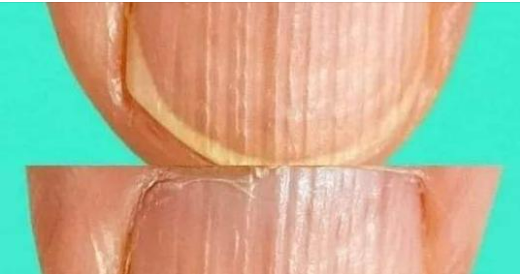Having Striped Nails Could Mean That Your Body Is…

Vertical ridges are furrows that run from the tip of your fingernail down to the cuticle. They are sometimes called longitudinal striations or bands.
Slight vertical ridges in fingernails often develop in older adults, possibly due to a slowing of cell turnover. This is when new skin cells produced below the surface of your skin rise up to take the place of discarding dead cells from the surface.
If you experience other symptoms like texture changes in your nails, it may be caused by a medical condition. In trachyonychia (twenty-nail dystrophy), the ridges may look shiny or brittle.
Iron deficiency anemia can also trigger vertical ridges and changes to your nails that make them concave or spoon-shaped.
Deep horizontal ridges, called Beau’s lines, are often a symptom of serious conditions. They may actually stop nail growth until the underlying condition is treated.
If Beau’s lines appear, acute kidney disease may also be present.
According to a 2023 research review, medications — particularly chemotherapy drugs — were the most common cause of Beau’s lines. Other causes included:
- non-autoimmune system diseases, such as:
- mumps
- parathyroid disease
- unmanaged diabetes
- syphilis
- respiratory conditions
- illnesses that cause prolonged high fevers
- zinc deficiency
- trauma
- infection
Trauma to your nails can cause red or brown spots to form underneath your nails.
If you notice dark brown, black, or red color changes under your nails and haven’t experienced nail trauma, it may be a symptom of a more serious condition, like endocarditis or melanoma.
Diagnosing the problem
A doctor should examine changes in your nails. If you damaged your nail in an injury, you may wait to see how the nail and your finger heal for a few weeks before deciding whether to see a doctor.
However, you should see a doctor as soon as possible if the injury results in:
- a clean or ragged cut through your nail
- a crushed nail
- a nail that is torn off
- bleeding under your nail
If you experience nail changes outside an injury, you’ll still want to be evaluated. During your appointment, your doctor will examine your nails and ask about any other symptoms you’re experiencing.
Your doctor may order urine and blood tests if they suspect kidney disease, diabetes, or nutritional deficiencies.
If it seems like the ridges are the result of a skin condition, a dermatologist can start you on a treatment plan.
If the cause of your fingernail ridges is unclear, a dermatologist may take some fingernail clippings to have them analyzed in a lab for signs of infection.
How to get rid of ridges
Because fingernail ridges are often signs of other health problems, treatment focuses on the underlying cause of the changes to your nails. For example, if you have developed Beau’s lines because of diabetes, successfully managing your blood sugar may reduce these horizontal fingernail ridges.
Treatment for skin conditions like eczema may include moisturizers for your hands or topical ointments to reduce eczema symptoms.
If low levels of minerals or vitamins are the cause, you may be advised to alter your diet or take supplements to boost your levels.
Ask a dermatologist for advice on treating your nails. You’ll want to be careful not to cause further damage.
You can connect to a dermatologist in your area using the Healthline FindCare tool.
What do ridges in your nails mean?
Ridges in your nails are usually harmless but can mean different things. Vertical ridges are often a sign of aging, while horizontal ridges can point to issues like malnutrition, serious nail injury, or Beau’s lines.
What causes ridges in nails?
According to 2022 research, ridges are usually due to aging. But they can also be a sign of improper nail care, nail trauma, vitamin deficiencies, or even a more pressing medical condition.
Can nutritional deficiencies cause ridges in nails?
Certain nutritional deficiencies can affect your nails. For example, iron deficiency may cause vertical ridges in your nails. Other vitamins that can contribute to the health of your nails include zinc and vitamins A, C, and D.
According to 2018 research, biotin is also highly recommended to aid in nail health, but more research is still needed to under the full extent of its benefits.
Can you buff out ridges in nails?
Some dermatologists suggest that you can gently buff nails to remove ridges. But it’s recommended to stick with moisturizing your nails, keeping them trimmed, and checking with a dermatologist for further considerations.
What’s the outlook for people with ridges in their nails?
Most of the time, ridges in fingernails are a typical sign of aging. However, it’s important to pay attention to fingernail ridges and other nail changes. These might be the first signs of a serious medical problem.



